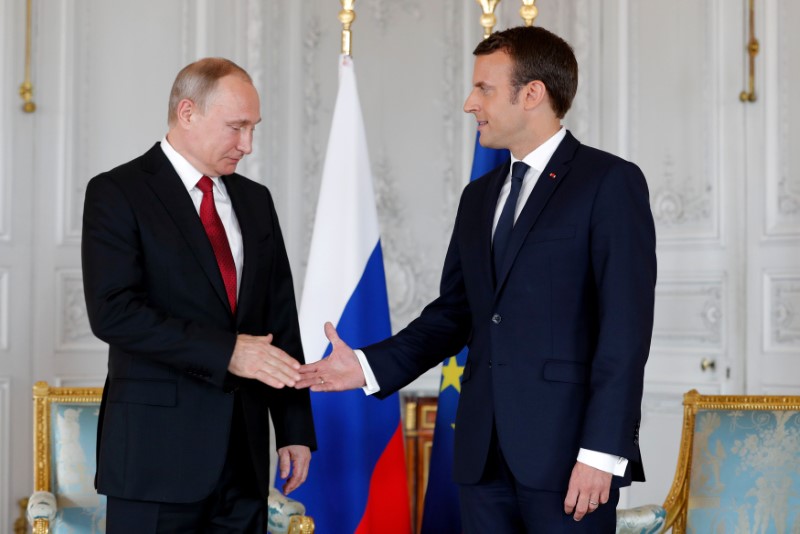By John Irish
PARIS (Reuters) - President Emmanuel Macron is starting to realign France's foreign policy, setting out plans to be less interventionist in conflicts abroad and putting his country's national security at the heart of diplomacy.
When Macron, 39, took office just over a month ago, he was widely expected to put the emphasis on continuity in foreign policy, an area in which he is a newcomer.
Following a policy based largely on ideological interests, France has in recent years been quick to intervene militarily in conflicts such as those in Libya, Mali and Central African Republic. That appears to be about to change under Macron.
This week he dropped demands for President Bashar al-Assad to depart as a condition for any peace settlement in Syria and held out an olive branch to Russian President Vladimir Putin at talks in Versailles on May 29.
Macron appears to be broadly aligning his foreign policy with the U.S. priorities of tackling terrorism while seeking better ties with Russia, which he considers a long-term partner rather than a direct threat to Europe.
Diplomats and officials say he is also seeking to shift policy by making clear his immediate aims are to weaken Islamist militants who threaten France from the Middle East and embark only on diplomatic initiatives that can bring concrete results.
"With me it will be the end of this sort of neo-conservatism that has been imported to France over the last 10 years," Macron told eight European newspapers this week.
"We need to rediscover the coherence and strength of an international policy that restores credit and to have an unrelenting security policy ... to fight terrorism."
FOCUS ON AREAS WHERE REWARDS POSSIBLE
French interventions in Middle East conflicts and its rigorous secularism have exposed it to attack by Islamist militants. Gunmen and suicide bombers killed 130 people in and around Paris in November 2015 and over 100 were killed in other Islamist attacks in France in the past two-and-a-half years.
Some veteran French diplomats and officials say the policies of Macron's predecessors, Francois Hollande and Nicolas Sarkozy, kept the country on the front line while others, such as the United States and Britain, pulled back from foreign adventures.
France also joined sanctions against Russia after it seized the Crimea peninsula from Ukraine in 2014.
Under Macron, France's focus appears likely to shift to areas where Washington sees little added value, such as Africa, or to climate change, on which Washington and Paris disagree.
"You can bet that the Middle East peace initiative we promoted for the last few years is dead and buried," said a French diplomat of international efforts to improve ties between Israel and the Palestinians.
By contrast, under Macron France has a rough plan for peace between rival factions in Libya, and has for the first time openly called for a united national army that includes eastern militia commander Khalifa Haftar to battle Islamist militants.
"Macron wants his team to focus on areas where there can be solutions and rewards for France. I think he has realized that France is limited in what it can do and what its influence can bring," said a Paris-based Middle Eastern diplomat.
"I think he sees things in terms of what are his red lines and beyond that, everything is negotiable."
Nowhere is this more apparent than over the conflict in Syria. Since 2011, French policy on Assad had centered on openly calling for his eventual departure from power, backing his opponents, and pushing for a U.N-brokered transition.
With the U.S. increasingly disengaged on Syria, that stance put France in conflict with Russia, Assad's main international backer. Francois Hollande, who preceded Macron as president, at times described Russia's action in Syria as war crimes, and under Hollande France pushed for resolutions at the U.N. Security Council aimed at punishing Assad's government.
Macron and his foreign minister, Jean-Yves Le Drian, have dropped such public criticisms and the red line Macron has set in Syria aligns with U.S. President Donald Trump's: both say the use of chemical weapons would result in a military response.
Macron has also said the humanitarian situation must improve -- a stance Paris feels can help secure concessions from Moscow.
"They want to do everything to make sure the dialogue with Russia works so they can find a place back at the negotiating table," said a humanitarian official with knowledge of the new presidency
PROXY FORCES
Le Drian, a defense minister under Hollande, has long had a security-focused outlook on foreign policy and led France's response to Islamist militants in Mali, Libya and Syria.
Keeping Le Drian in his cabinet is also widely seen as a sign that Macron wants to nurture Le Drian's close relationship with several powerful leaders, including Egyptian President Abdel Fattah al-Sisi or Chad's president, Idriss Deby.
The aim of this is to help develop proxy forces in areas where France no longer wants to intervene but needs local forces on the ground.
A French push at the United Nations to create a new regional counter-terrorism force in West Africa, alongside France's 4,000 troops, is one example. Another is France's quiet support for Haftar in Libya to oppose Islamist militants.
Macron's approach has, however, caused unease among some French diplomats who call it one-dimensional, leaving France exposed to the whims of both the Russians and Americans.

"It's an overly military vision of things," said a senior French diplomat. "Security has always been a core axis of our diplomacy, but you can't do diplomacy by only focusing on security."